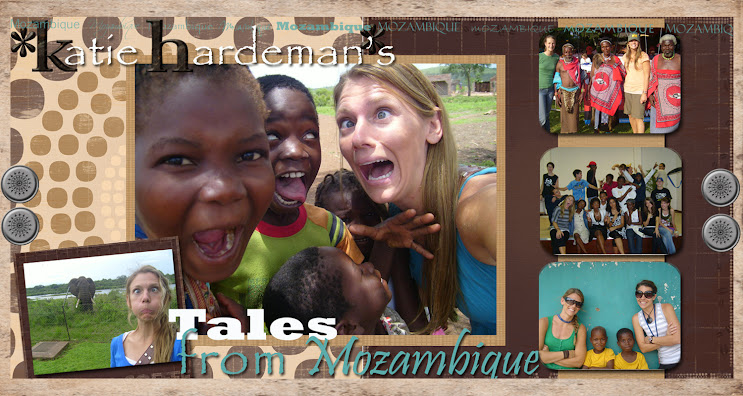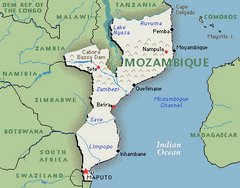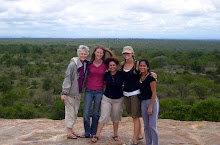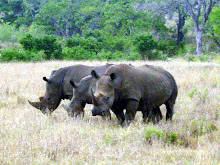We've also several discussions recently about how Africa is much more "spiritually-minded" than the West. Henrik was telling me how in one village they were not allowed to use the water
 of the local lake because they believe the deceased witch doctor had turned into a crocodile that lived in the lake. Such stories sound so silly to me and it's hard to believe that grown, educated people believe such tales but it points to the fact that Mozambicans are bigger believers in the spiritual world than us "educated" Westerners. I internally scoffed when I heard that one village believed a lion that invaded the village and killed a man, was actually a reincarnated witch doctor, serving justice. However, to have the faith that such a thing could happen, reveals that Mozambicans are quicker to believe without seeing and without proof. They are more in-tune with the spiritual world, more aware of this unseen world I often ignore and thus they are quicker to believe in miracles and attribute acts to God or the "spirits" rather searching for logical, scientific explanations. Although I am saddened by the rampant "ancestor worship" and "syncritism" which is so prevalent here, I admire the simplistic faith of the Mozambicans. Science seems to have hardened our (referring to the West's) hearts towards the spiritual world so that even we Christians struggle to believe in miracles and to acknowledge this world that we cannot see.
of the local lake because they believe the deceased witch doctor had turned into a crocodile that lived in the lake. Such stories sound so silly to me and it's hard to believe that grown, educated people believe such tales but it points to the fact that Mozambicans are bigger believers in the spiritual world than us "educated" Westerners. I internally scoffed when I heard that one village believed a lion that invaded the village and killed a man, was actually a reincarnated witch doctor, serving justice. However, to have the faith that such a thing could happen, reveals that Mozambicans are quicker to believe without seeing and without proof. They are more in-tune with the spiritual world, more aware of this unseen world I often ignore and thus they are quicker to believe in miracles and attribute acts to God or the "spirits" rather searching for logical, scientific explanations. Although I am saddened by the rampant "ancestor worship" and "syncritism" which is so prevalent here, I admire the simplistic faith of the Mozambicans. Science seems to have hardened our (referring to the West's) hearts towards the spiritual world so that even we Christians struggle to believe in miracles and to acknowledge this world that we cannot see. Most Mozambicans therefore believe that death is obviously not the end. However, when one spirit does pass from this world, it is an indescribable tragedy which makes the funerals here very sorrowful. I had a very steep learning curve about Mozambican culture and traditions as I attended a funeral last week which I will never forget.
Teresa is our empragada. Every week day she does our dishes, washes our clothes, makes our beds, scrubs the floors, etc. It is a very common job here although the pay is quite little. Unfortunately she speaks no English so our communication has been limited to, "Hi. All is well?" "All is well thank you. And you?" "All is well." The father of her son died a few months back because he had AIDS but she assured us that she does not. Then last week her only son Francis,
 who was just 4 years old, complained of a tummy ache and then died a few hours later for unknown reasons. The day he died, I went with Madalena, Henrik and Henrik's sister Cecilia to pay our respects at Teresa's home. When we entered her 2-room, cement block home, she was laying on the floor, surrounded by 14 other women who were singing mournful songs in the local tongue, Chingana. Occasionally Teresa would let out a wail with such sorrow I had never heard before and the women would sing louder and continue stroking her arms. It was amazing to see how this culture deals with death- the family is not left alone and not expected to be strong- they are allowed to wail and be weak, knowing their community will take care of them.
who was just 4 years old, complained of a tummy ache and then died a few hours later for unknown reasons. The day he died, I went with Madalena, Henrik and Henrik's sister Cecilia to pay our respects at Teresa's home. When we entered her 2-room, cement block home, she was laying on the floor, surrounded by 14 other women who were singing mournful songs in the local tongue, Chingana. Occasionally Teresa would let out a wail with such sorrow I had never heard before and the women would sing louder and continue stroking her arms. It was amazing to see how this culture deals with death- the family is not left alone and not expected to be strong- they are allowed to wail and be weak, knowing their community will take care of them. The following afternoon was the funeral. Cecelia took her camera along which I was thankful for since it is a ceremony and day I will never forget. We arrived at the cemetery and were surrounded by vendors selling flowers which we bought, unaware of what we would later be planting them on top of Francis grave. We found Teresa's friends in the midst of the sea of bodies which was quite difficult because there were at least 20 funerals that day and the crowds were large. Teresa was still surrounded by the women as we waited for the cart to arrive to carry the tiny, wooden casket.
 When the cart arrived, we formed a procession behind it and walked through the graveyard for nearly half a mile. At one point a woman in front of me screamed in sorrow and collapsed. The woman behind her scooped up some dirt from the path and rubbed into the other woman's skirt- I'm still curious about this ritual- but then they continued on. We walked and walked until we were in a field of weeds and realized this was the part of the graveyard for the poor.
When the cart arrived, we formed a procession behind it and walked through the graveyard for nearly half a mile. At one point a woman in front of me screamed in sorrow and collapsed. The woman behind her scooped up some dirt from the path and rubbed into the other woman's skirt- I'm still curious about this ritual- but then they continued on. We walked and walked until we were in a field of weeds and realized this was the part of the graveyard for the poor.
 There would be no headstone, no marking, simply a dirt hole which was dug while we stood in a circle watching. Teresa is a believer and the pastor spoke in Chingana and then several songs were sung. Since it was the middle of the afternoon, the sun was beating down on us and 2 women passed out from the heat and had to be carried away. The top of the casket was lifted to reveal sweet little Francis, lying peacefully with his blue beanie. The entire procession then walked around the casket and sprayed perfume onto Francis. Being so near to the body, there
There would be no headstone, no marking, simply a dirt hole which was dug while we stood in a circle watching. Teresa is a believer and the pastor spoke in Chingana and then several songs were sung. Since it was the middle of the afternoon, the sun was beating down on us and 2 women passed out from the heat and had to be carried away. The top of the casket was lifted to reveal sweet little Francis, lying peacefully with his blue beanie. The entire procession then walked around the casket and sprayed perfume onto Francis. Being so near to the body, there  were many wails of sorrow. I was a mess when I watched Teresa at the funeral but when I approached little Francis, I was surprisingly calm. The verse that kept running through my head was, "Where, O death, is your victory? Where, O death, is your sting?" As I sprayed the perfume around Francis' face, it was so obvious that his spirit was not there- this was merely the shell. I knew without a doubt as I passed by him, that Francis was not in the casket, Francis was running and jumping in heaven.
were many wails of sorrow. I was a mess when I watched Teresa at the funeral but when I approached little Francis, I was surprisingly calm. The verse that kept running through my head was, "Where, O death, is your victory? Where, O death, is your sting?" As I sprayed the perfume around Francis' face, it was so obvious that his spirit was not there- this was merely the shell. I knew without a doubt as I passed by him, that Francis was not in the casket, Francis was running and jumping in heaven.Once the casket was lowered into the freshly-dug hole, we threw the dirt onto the casket and it was quickly covered. Once there was a mound of dirt, all of the people holding flowers went to the mound and planted the flowers on top of the grave. It was the constructed in a matter of minutes but perhaps most beautiful garden I've seen.
The pastor later thanked us for coming and explained that the "employers" rarely came to such occasions so it made quite an impression. It was difficult to watch Teresa endure such pain and be so helpless to help her and offer any words of encouragement. Since that day, I've yet to see her smile. Please pray for Teresa- that the LORD would restore unto her the joy of salvation; that she would be reminded of where Francis is and that she will one day join him; that she would be strengthened and comforted; that she would not lose faith in God and that He would shower her with His peace.
































1 comment:
Oh Katie, that is so sad, I'm sure experiencing the funeral of little Francis is something you will never forget. Enjoy those last 50 days b/c we cannot wait to have you home in CA onto your new adventures at VCHS.
Love, Aunt Letty
Post a Comment